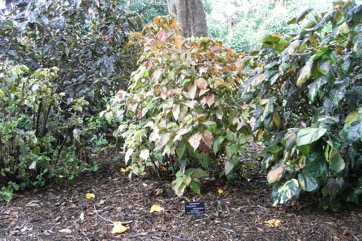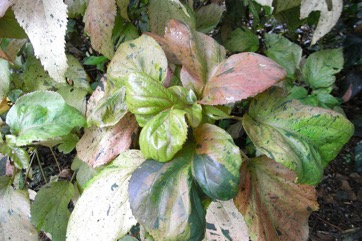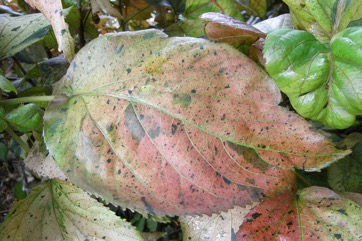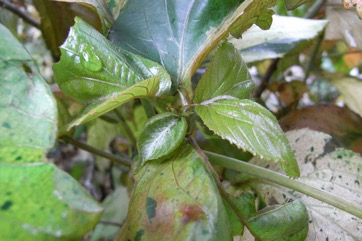Painted copperleaf

A tropical and subtropical plant. A plant which grows naturally in Vanuatu. It occurs in the Pacific Islands. It prefers light well drained soil. It suits a protected shady position. It is damaged by both drought and frost. It needs a minimum temperature above 10°C. It can grow in arid places. It suits hardiness zones 9-12.
Also known as:
Akalifa merah tembaga, Beefsteak Plant, Beaf-tea plant, Daun merah tambaga, Fijian fire plant, Fire Dragon Plant, Hu-ling, Joseph's coat, Hoja de Cobre, Huu-krataai, Làlǐyè, Mexican payasito, Redleaf, Saydan-kya, Tai tuong, Te aronga
Synonyms
- Acalypha amentacea forma circinata (Müll.Arg.) Fosberg
- Acalypha amentacea subsp. wilkesiana (Müll.Arg.) Fosberg
- Acalypha circinata A.Gray ex Seem. [Invalid]
- Acalypha compacta Guilf. ex C. T. White
- Acalypha godseffiana Mast.
- Acalypha godseffiana var. heterophylla L. H. Bailey
- Acalypha hamiltoniana Briant
- Acalypha illustris Pax & K.Hoffm. [Invalid]
- Acalypha macafeeana Veitch
- Acalypha macrophylla Veitch [Illegitimate]
- Acalypha marginata (Mill.) J. J. Sm. [Illegitimate]
- Acalypha musaica auct.
- Acalypha torta Pax & K.Hoffm. [Invalid]
- Acalypha tricolor Seem.
- Acalypha triumphans L. Linden & Rodigas
- Acalypha wilkesiana forma appendiculata J. W. Moore
- Acalypha wilkesiana forma circinata Müll.Arg.
- Acalypha wilkesiana forma illustris J. J. Sm.
- Acalypha wilkesiana forma macrophylla J. J. Sm.
- Acalypha wilkesiana var. marginata E. Morren
- Acalypha wilkesiana forma monstrosa J. J. Sm.
- Acalypha wilkesiana forma triumphans (L. Linden & Rodigas) J. J. Sm.
- Ricinocarpus wilkesianus (Müll.Arg.) Kuntze
Edible Portion
- Leaves, Flowers, Vegetable, Leaves - tea
Where does Painted copperleaf grow?
Found in: Africa, Asia, Australia, Bermuda, Central Africa, China, Congo DR, East Africa, Fiji, Hawaii, Indochina, Indonesia, Kenya, Kiribati, Malaysia, Marquesas, Mexico, Myanmar, Nauru, Nigeria, Norfolk Island, North America, Pacific, Pakistan, Papua New Guinea, PNG, Polynesia, Rotuma, Sao Tome and Principe, SE Asia, Sri Lanka, Tanzania, Thailand, Tonga, Tuvalu, Uganda, United States, Vanuatu, Vietnam, West Africa, Zimbabwe
Notes: There are over 450 Acalypha species. They are tropical. There are 225 in tropical America.
Status: It is not known if it is used as food in PNG. It is sold in local markets. It is cultivated.
Growing Painted copperleaf
Cultivation: Plants can be grown from seeds. It can be grown from hardwood cuttings taken when growth is less vigorous. It forms a suitable hedge plant.
Edible Uses: The cooked young leaves are eaten. The leaves are rich in protein. They are used in stews.
Nutrition Info
per 100g edible portion| Edible Part | Energy (kcal) | Protein (g) | Iron (mg) | Vitamin A (ug) | Vitamin c (mg) | Zinc (mg) | % Water |
|---|---|---|---|---|---|---|---|
| Leaves fresh | - | 7-Jun | - | - | - | - |
Painted copperleaf Photos




References
Bircher, A. G. & Bircher, W. H., 2000, Encyclopedia of Fruit Trees and Edible Flowering Plants in Egypt and the Subtropics. AUC Press. p 5
Bodkin, F., 1991, Encyclopedia Botanica. Cornstalk publishing, p 38
Brickell, C. (Ed.), 1999, The Royal Horticultural Society A-Z Encyclopedia of Garden Plants. Convent Garden Books. p 62
A. L. P. P. de Candolle, Prodr. 15(2):817. 1866
Diaz-Betancourt, M., et al, 1999, Weeds as a future source for human consumption. Rev. Biol. Trop. 47(3):329-338
Engel, D.H., & Phummai, S., 2000, A Field Guide to Tropical Plants of Asia. Timber Press. p 178
Etherington, K., & Imwold, D., (Eds), 2001, Botanica's Trees & Shrubs. The illustrated A-Z of over 8500 trees and shrubs. Random House, Australia. p 58
Flora of Australia Volume 49, Oceanic Islands 1, Australian Government Publishing Service, Canberra. (1994) p 231
Flora of Pakistan. www.eFloras.org
Latham, P. & Mbuta, A. K., 2017, Plants of Kongo Central Province, Democratic Republic of Congo. 3rd ed p 15
Li, D. et al, 2017, Ethnobotanical survey of herbal tea plants from the traditional markets in Chaoshan, China. Journal of Ethnopharmacology. 205 (2017) 195-206
Llamas, K.A., 2003, Tropical Flowering Plants. Timber Press. p 187
Lord, E.E., & Willis, J.H., 1999, Shrubs and Trees for Australian gardens. Lothian. p 203
Martin, F.W. & Ruberte, R.M., 1979, Edible Leaves of the Tropics. Antillian College Press, Mayaguez, Puerto Rico. p 48, 191
McMakin, P.D., 2000, Flowering Plants of Thailand. A Field Guide. White Lotus. p 16
Ochse, J.J. et al, 1931, Vegetables of the Dutch East Indies. Asher reprint. p 258
Peekel, P.G., 1984, (Translation E.E.Henty), Flora of the Bismarck Archipelago for Naturalists, Division of Botany, Lae, PNG. p 308
Royal Botanic Gardens, Kew (1999). Survey of Economic Plants for Arid and Semi-Arid Lands (SEPASAL) database. Published on the Internet; http://www.rbgkew.org.uk/ceb/sepasal/internet [Accessed 16th April 2011] (As Acalypha amentacea subsp. wilkesiana)
Siemonsma, J. S. & Kasem Piluek, eds. 1993. Vegetables. In: Plant Resources of South-East Asia (PROSEA) 8:311.
Slik, F., www.asianplant.net
Smith, A.C., 1981, Flora Vitiensis Nova, Lawaii, Kuai, Hawaii, Volume 2 p 525
Staples, G.W. and Herbst, D.R., 2005, A tropical Garden Flora. Bishop Museum Press, Honolulu, Hawaii. p 280
Sukarya, D. G., (Ed.) 2013, 3,500 Plant Species of the Botanic Gardens of Indonesia. LIPI p 577
Thaman, R. R., 1987, Plants of Kiribati: A listing and analysis of vernacular names. Atoll Research Bulletin No. 296
Thaman, R. R, 2016, The flora of Tuvalu. Atoll Research Bulletin No. 611. Smithsonian Institute p 83
Terra, G.J.A., 1973, Tropical Vegetables. Communication 54e Royal Tropical Institute, Amsterdam, p 18
World Checklist of Useful Plant Species 2020. Royal Botanic Gardens, Kew
Young, J., (Ed.), 2001, Botanica's Pocket Trees and Shrubs. Random House. p 52
Yuncker, T.G., 1959, Plants of Tonga, Bernice P. Bishop Museum, Hawaii, Bulletin 220. p 164